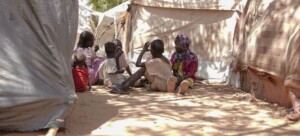‘Unprecedented’ malaria, dengue epidemics in North Darfur
On Wednesday, North Darfur health authorities reported that 23 people died of malaria and four of dengue fever during the past week, stressing that the state has never seen such epidemics before. The federal Minister of Health announced an emergency plan to contain the spread of diseases in the region.
 Women and their children are waiting for medical treatment in Kassab camp for the displaced in North Darfur ( Albert González Farran/Unamid)
Women and their children are waiting for medical treatment in Kassab camp for the displaced in North Darfur ( Albert González Farran/Unamid)
On Wednesday, North Darfur health authorities reported that 23 people died of malaria and four of dengue fever during the past week, stressing that the state has never seen such epidemics before. The federal Minister of Health announced an emergency plan to contain the spread of diseases in the region.
According to Maj Gen Malik Khojali, Acting Governor of North Darfur, the state is suffering from a major shortage of medical and technical personnel. He told reporters on Wednesday that 23 malaria patients and four dengue fever patients died the past week.
On Wednesday, federal Health Minister Akram El Tom arrived in El Fasher, capital of North Darfur, where he inspected health facilities, and listened to the patients, their relatives, and medical staff.
During a joint meeting with the North Darfur Emergency Committee and district committees in El Fasher, capital of North Darfur, on Thursday, he introduced a 40-day programme to control vector-borne diseases in the state.
The programme will provide technical and logistical support, including specialised cadres, medicines, and enhanced immunisation programmes.
El Tom further called on international relief organisations “to provide maximum support and aid to North Darfur” to enable the health authorities to control the major malaria epidemic and other vector-borne diseases in the region.
He as well urged support for the poorest families and vulnerable groups, to reduce malnutrition, and thus the number of people susceptible to diseases.
The Sudanese Doctors Central Committee in North Darfur already pointed in early October to a lack of medicines, medical equipment, and a significant shortage of doctors and nurses, which delays the treatment of patients. They further noted that many people are malnourished due to the continuing economic crisis.
Outbreaks
Between August 25 and September 25, more than 19,000 cases of malaria were recorded in North Darfur.
In the end of October, the Sudanese Doctors Central Committee in North Darfur pointed to a new wave of malaria sweeping across the state, causing serious complications among weak patients, and leaving a number of deaths.
During the past couple of months, Sudan has been facing several vector-borne disease outbreaks including dengue fever, Rift Valley fever (RVF), chikungunya, and malaria. The diseases can be linked to the recent floods in the country that have left large pools of stagnant water, which are breeding sites for vectors such as mosquitoes.
The Sudanese authorities and humanitarian partners are actively responding to these outbreaks across the country, providing health assistance and vector control interventions.
The UN Office for the Coordination of Humanitarian Affairs (OCHA) in Sudan stated in its updated Situation Report on November 21 that 2,569 cases of dengue fever have been recorded across the country since the disease broke out in early August.
Radio Dabanga’s editorial independence means that we can continue to provide factual updates about political developments to Sudanese and international actors, educate people about how to avoid outbreaks of infectious diseases, and provide a window to the world for those in all corners of Sudan. Support Radio Dabanga for as little as €2.50, the equivalent of a cup of coffee.












 and then
and then